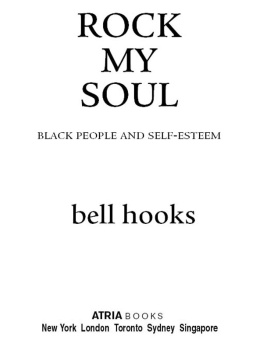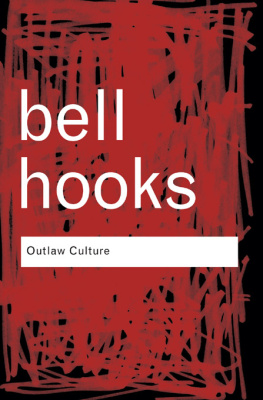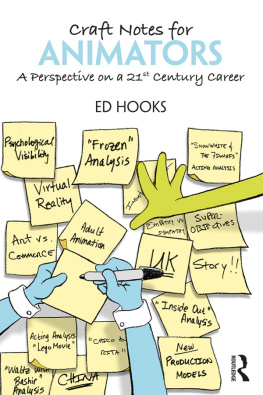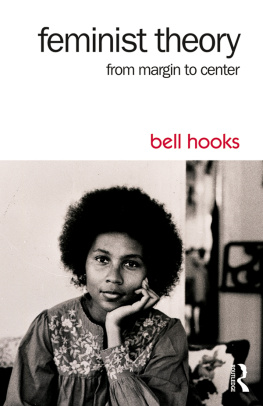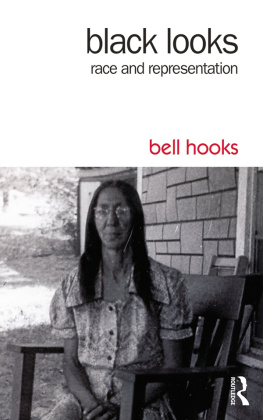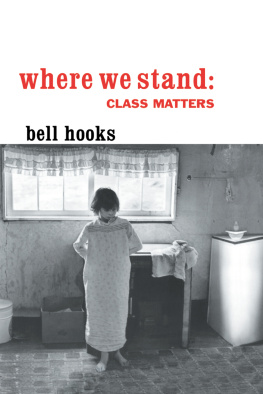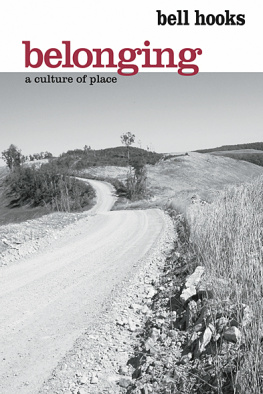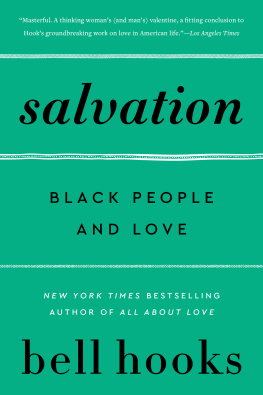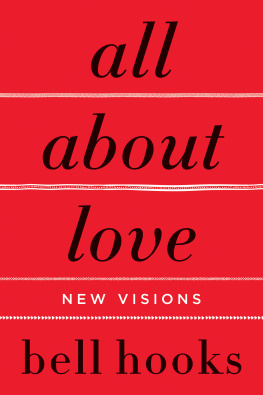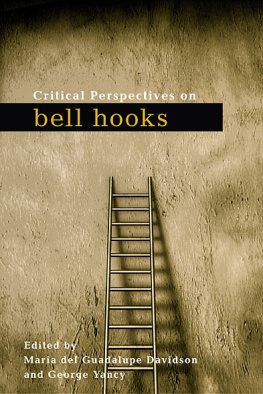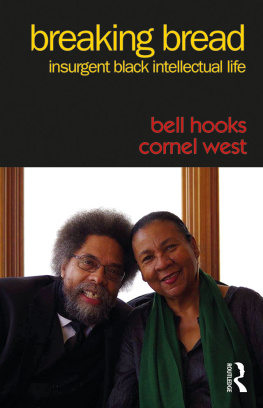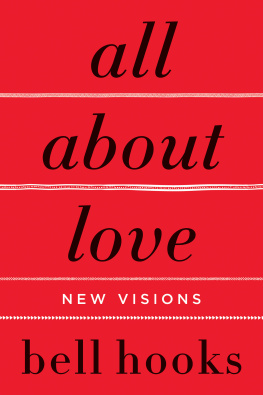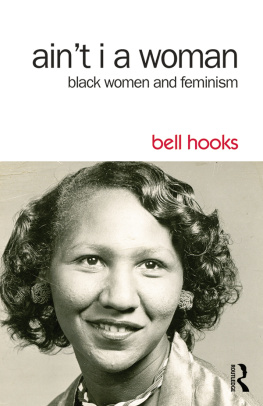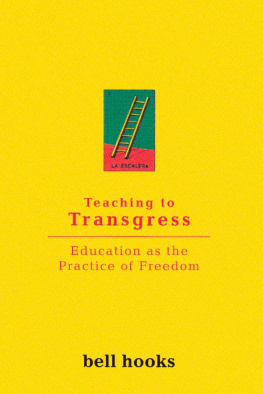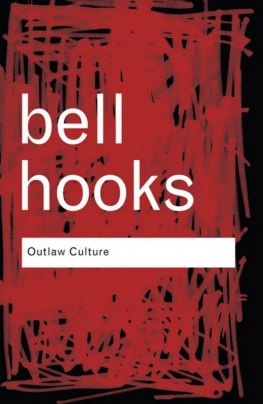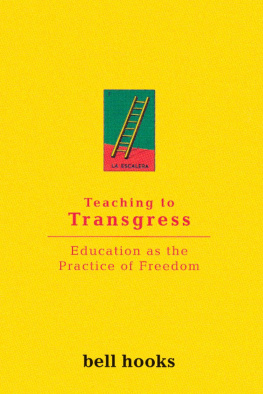Also by bell hooks
Aint I a Woman: Black Women and Feminism (1981)
Feminist Theory: From Margin to Center (1984)
Talking Back: Thinking Feminist, Thinking Black (1989)
Yearning: Race, Gender, and Cultural Politics (1990)
Breaking Bread: Insurgent Black Intellectual Life (1991)
Black Looks: Race and Representation (1992)
A Womans Mourning Song (1993)
Sisters of the Yam: Black Women and Self-Recovery (1993)
Teaching to Transgress: Education as the Practice of Freedom (1994)
Outlaw Culture: Resisting Representations (1994)
Art on My Mind: Visual Politics (1995)
Killing Rage: Ending Racism (1995)
Reel to Real: Race, Sex, and Class at the Movies (1996)
Bone Black: Memories of Girlhood (1996)
Wounds of Passion: A Writing Life (1997)
Remembered Rapture: The Writer at Work (1998)
Happy to Be Nappy (1999)
All about Love: New Visions (1999)
Feminism Is for Everybody: Passionate Politics (2000)
Where We Stand: Class Matters (2000)
Salvation: Black People and Love (2001)
Communion: The Female Search for Love (2002)
Be Boy Buzz (2002)
Homemade Love (2002)

1230 Avenue of the Americas
New York, NY 10020
Copyright 2003 by Gloria Watkins
All rights reserved, including the right to reproduce this book or portions thereof in any form whatsoever. For information address Atria Books, 1230 Avenue of the Americas, New York, NY 10020
ISBN-10: 0-7434-5777-3
ISBN-13: 978-0-7434-5777-4
ATRIA BOOKS is a trademark of Simon & Schuster, Inc.
Visit us on the World Wide Web:
http://www.SimonSays.com
What do you mean, project a good image? An image to who? Who dont like the image I project? Thats the weakest thing Ive heard yet; Im not a good image. For my people, Im the best image in the world.
Muhammad Ali
Contents
Touch me on the inside part and call me my name
Toni Morrison, Beloved
Preface
The Inside Part: Self-Esteem Today
A few years ago, a national news magazine had a cover story with the heading, WHATEVER HAPPENED TO BLACK AMERICA? I leafed through the pages at a newsstand, scanning the statistics about joblessness, welfare mothers, divorce rates, drug addiction, and put it down, recognizing that the stories the writers chose to tell about black American life were the ones that would support and affirm the notion that very little of interest to anyone was happening in black life. As a cultural critic writing about the representation of blackness in mass media, I was stunnedenragedby this construction of blackness. I felt powerless in the face of the powerful white folks running this magazine who could decide to announce the disappearance, the death of an entire race to sell magazines.
Self-congratulatory in tone, the stories gist was that black folks had wiped themselves out, had committed a collective cultural genocide, that we gave them rights and opportunity and look what they did with it. Such sentiments were common in the wake of affirmative-action backlash. Once you publicly pronounce that a people are culturally gone, no longer there to be looked at, gazed upon, or talked about, then you rid yourself of the issue of accountability. You announce their doom and tell the world that they chose this fatepassive disappearance, silent self-sabotage, symbolic suicide. Daringly you expose their secret shame. And the source of that shame was that with so much going for them black folks had done so little. And racism was not to blame.
If racism was not to blame for a lack of progress in black life, then what could the issue be? No one seemed then or in recent times to be able to answer that question. While I never accepted the notion that black people had disappeared, I had begun to wonder why we were not doing more and why with so much opportunity and success on all fronts there was so much suffering in the lives of black folks. The suffering was not limited to the poor and the underclass. It had and has no relation to how much money we are making or how successful we are.
Long before I began to look around me and saw how widespread this underlying emotional distress was, I saw it first in the students I encountered at the Ivy League institutions where I taught. They were among the best and the brightest and oftentimes the beautiful, yet they were beset by deep feelings of unworthiness, of ugliness inside and outside. They were overwhelmed by all the choices before them and unable to assert meaningful agency. More often than not they were depressed without knowing why, drugswhether illegal or prescriptiondid not solve the problem, and there were more attempted suicides than anyone cared to talk about.
From the very first moment I listened to their stories, whether in my office, on my couch at home, or in hospital rooms, what I heard voiced was a profound lack of self-esteem. And when I listened to my peers, the generation of baby boomers who had excelled and made their mark, I heard similar narratives. I heard folks talk about deep feelings of inadequacy, of not being enough, even when they could not define what the enough would be. I heard and hear feelings of shame, guilt, inferiority. Finally, after hearing confessions of self-loathing and self-distrust, I was compelled to face the reality underlying this testimony. I wanted to do something, to find the explanations and the solutions. From all my research I returned again and again to the issue of self-esteem.
African Americans have collectively grappled with the issue of self-esteem from slavery to the present day. One of the growing causes of alarm has been the intensification of low self-esteem in the face of all manner of opportunities that were not there for our ancestors. And though racism and white supremacy are still the order of the day, they are not as powerful determinants of our lot in life as they once were. Looking at my family, I have often pondered why my brother, my five sisters, and I seemed to be way more psychologically fragile than our parents before us. Like in many southern black families where education had been pushed, we had all studied, learned, earned degrees, made money. And while all our lives we have had a level of material privilege that our parents had not known, material gain had not served to change basic self-concepts. Again and again in our conversations we returned to the issue of self-esteem.
None of us imagine that we can go to a doctor who will give us a prescription for healing without first examining us to find the roots of our problem. In Rock My Soul: Black People and Self-Esteem this is the path I take: rigorous examination of the issue concluding with suggestions of what we can do. Throughout Rock My Soul I rely on the work of psychologist Nathaniel Branden to provide useful definitions of self-esteem that have stood the test of time. He explains: Self-esteem, fully realized, is the experience that we are appropriate to life and to the requirements of life. Self-esteem is confidence in our ability to think; confidence in our ability to cope with the basic challenges of life; and confidence in our right to be successful and happy; the feeling of being worthy, deserving, entitled to assert our needs and wants, achieve our values, and enjoy the fruits of our efforts. Branden identified six pillars of self-esteem: personal integrity, self-acceptance, self-responsibility, self-assertion, living consciously, and living purposefully. Without self-esteem people begin to lose their sense of agency. They feel powerless. They feel they can only be victims. The need for self-esteem never goes away. And it is never too late for us to acquire the healthy self-esteem that is needed if we are to have fulfilling lives.

